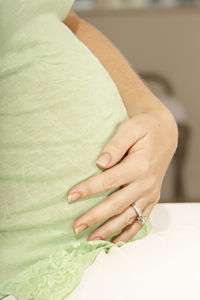Bisphenol A exposure impacts in-vitro fertilization

(Medical Xpress) -- A University at Albany-led research team has identified a link between exposure to bisphenol A (BPA), a molecular component of plastics and resins used in baby bottles and the linings of canned foods, and a reduction in the peak estrogen concentrations among women undergoing in-vitro fertilization (IVF). The reduced estrogen concentrations could adversely influence the quality of egg-containing follicles.
In a study published this month in Fertility and Sterility, 44 women undergoing IVF provided blood specimens on the day their eggs were retrieved for insemination. After measuring the specimens for BPA, researchers detected an inverse association between the concentrations of BPA and peak levels of blood estrogen measured in the women during administration of medications to facilitate the IVF procedure. Each doubling of the concentration of BPA was associated with a 9-11 percent decrease in the peak-estrogen value, after adjusting for relevant factors including race, cigarette smoking, and ovarian reserve.
"We know from the literature that BPA interferes with the enzyme that catalyzes the conversion of testosterone to estrogen in the ovary, aromatase, so the biologic plausibility of this observation is strong," said Michael S. Bloom, the study's first author and an assistant professor in the departments of Environmental Health Sciences, and Epidemiology and Biostatistics at the University at Albany School of Public Health.
The study’s senior author, Victor Y. Fujimoto, clinical professor of Obstetrics, Gynecology and Reproductive Sciences at the University of California, San Francisco (UCSF), noted that, "We use estrogen measurements as predictors of ovarian response to stimulating medications during IVF. The appropriate rise of estrogen during stimulation is critical to ensuring the harvesting of healthy eggs. Identification of an environmental disruptor such as BPA that may adversely influence the measurement of the female hormone, estrogen, is obviously an important finding.” Fujimoto is also on the faculty of the UCSF Center for Reproductive Health.
The concentrations of BPA measured for the study were among the highest reported to date in blood specimens, adding to an increasing body of evidence suggesting that sources other than diet may contribute to human BPA exposure.
Although these results are preliminary, the study's authors caution that women undergoing IVF may want to limit their exposure to BPA prior to and during the IVF cycle, given the prior published data suggesting a negative effect on egg quality as well. It is not known at this time what critical window of exposure to BPA is necessary to have such effects on human eggs and estrogen measurements.
BPA was first created at the turn of the 20th century, and has been in use in industrial settings since the 1930s in polycarbonate plastic and resin found today in plastic bottles, children's sippy cups, plastic food storage containers, the linings of food cans, and thermal transfer paper, including shopping receipts.
A study by the same researchers in 2010 identified the first real evidence in humans that exposure to BPA could compromise the quality of a woman’s eggs retrieved for in vitro fertilization.
In 2009 the U.S. Food and Drug Administration (FDA) announced that it shares the perspective of the National Toxicology Program in its concerns about BPA exposure and the brain, behavior, and reproductive systems of infants and young children. In Canada, the European Union and several U.S. states, BPA is banned in the production of baby bottles and other plastics.
More information: www.fertstert.org/













